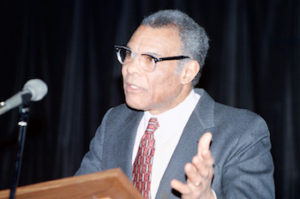
Paul Robeson Jr.
*Paul Robeson Jr. was born on this date in 1927. He was a Black author, activist, and translator.
Born in Brooklyn, the only child of Paul and Eslanda Robeson, as a boy, he traveled with his parents to Europe and lived with his grandmother in Moscow. While there, he became fluent in Russian and attended the same public school, he said, as Joseph Stalin’s daughter. The Robesons returned to the United States in 1938 to live first in Harlem, New York, and after 1941 in Enfield, Connecticut. Robeson, Jr. graduated from Enfield High School and attended Cornell University, where he graduated with a degree in electrical engineering in 1949.
Robeson Jr. was tall and athletic like his father; both men played football in college. While they had much in common, he said one difference was that he was a member of the Communist Party from 1948 to 1962, while his father never joined the party. After his father died in 1976, Mr. Robeson began to collect his father’s correspondence, recordings, and photographs for an archive, part of which is housed at Howard University. When the play “Paul Robeson” opened on Broadway in 1978, Robeson Jr. and several Black leaders, including Maya Angelou and Julian Bond, published a letter in Variety calling it a “pernicious perversion of the essence of Paul Robeson.”
The play, written by Phillip Hayes Dean, did not emphasize Mr. Robeson’s socialist views, they argued, to appeal to a mass audience. The show closed after 77 performances but returned to Broadway in 1988 and 1995, with Avery Brooks in the title role. During the first revival, Robeson Jr. said the production had improved but added, “I still feel the character as written is a counterfeit.” Robeson Jr. was a consultant for several films about his father, including a 1999 documentary for the PBS series “American Masters.”
Asked whether being in his father’s shadow was difficult, Robeson Jr. said that his father once told him: “If you want to be somebody, you’re going to have to be yourself. You can’t copy anybody else, especially me. So I never remember having any need to compete with him; he gave me a sense of being my own man.” Robeson Jr. wrote two books about his father and created an archive of his writing and films. He aimed to teach new generations about his father’s radical politics and criticized those he thought misrepresented his life, including a 1978 Broadway play starring James Earl Jones, which he protested. Robeson Jr. worked for many years as a Russian translator and a personal aide to his father.
In his later years, he wrote other books about politics and race. He admired his father and noted their similar political views in an interview with The New York Times in 1993 when he published his first book, “Paul Robeson Jr. Speaks to America.” He once said, “I follow in my father’s cultural tradition, and like him, I am a black radical.” Since his death almost four decades ago, Paul Robeson Jr., who worked to preserve his father's legacy as an actor, singer, and civil rights advocate, died in Jersey City on April 26, 2014. He was 86. The cause was lymphoma.